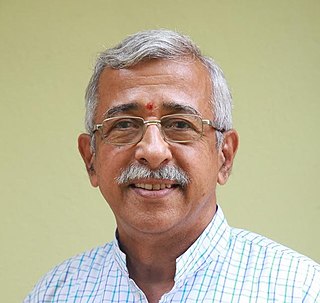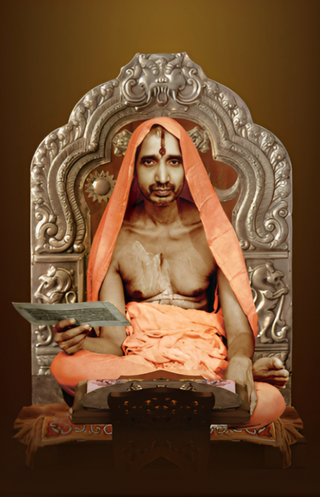
Raghavendra Tirtha, also referred as Raghavendra Swami, was a Vaishnava scholar, theologian, and saint. He was also known as Sudha Parimalacharya. His diverse oeuvre include commentaries on the works of Madhva, Jayatirtha, and Vyasatirtha, interpretation of the Principal Upanishads from the standpoint of Dvaita and a treatise on Purva Mimamsa. He served as the pontiff of the matha at Kumbakonam from 1621 to 1671. Raghavendra Tirtha was also an accomplished player of the veena and he composed several songs under the name of Venu Gopala. His shrine at Mantralayam attracts lakhs of visitors every year.

Vyāsatīrtha, also called Vyasaraja or Chandrikacharya, was a Hindu philosopher, scholar, polemicist, commentator and poet belonging to the Madhwacharya's Dvaita order of Vedanta. As the rajaguru of Vijayanagara Empire, Vyasatirtha was at the forefront of a golden age in Dvaita which saw new developments in dialectical thought, growth of the Haridasa literature under bards like Purandara Dasa and Kanaka Dasa and an increased spread of Dvaita across the subcontinent. He himself composed many kīrtanas in Kannada and Sanskrit.

The Uttaradi Math, is one of the main monasteries (matha) founded by Madhvacharya with Padmanabha Tirtha as its head to preserve and propagate Dvaita Vedanta (Tattvavada) outside Tulunadu region. Uttaradi Math is one of the three primary Dvaita monasteries or Mathatraya that descended from Madhvacharya in the lineage of Padmanabha Tirtha through Jayatirtha. After Jayatirtha and Vidyadhiraja Tirtha, Uttaradi Math continued in the lineage of Kavindra Tirtha and later in the lineage of Vidyanidhi Tirtha. The Moola Rama and Moola Sita idols worshipped in the Uttaradi Matha have a long history and are revered among adherents.
Rev. John Vattanky SJ was a Jesuit priest, belonging to Kerala province, in India. An Indian philosopher, specializing in Gangesa's Navya-Nyāya, he resided at De Nobili College, Pune. Vattanky was a Professor Emeritus of Jnana-Deepa Vidyapeeth, Pune, India. He has contributed significantly to the growth of Indian philosophy and Indian Christian Theology.

Mithila Prasad Tripathi is a Sanskrit poet who won the Sahitya Akademi Award for Sanskrit for 2010 for his poetry. The Sahitya Akademi is India's national academy of letters that awards the Jnanpith Award, India's highest literary award, and the Sahitya Akademi Award for each language is considered the second-highest literary award in India and the highest award for that language. He also won Rashtrapati Award in 2017, for his work in Sanskrit Language.
Navalpakkam Ramanuja Tatacharya was a Sanskrit scholar from India. He received the Chevalier of Légion d'honneur which is the highest civilian honour of France. He was a researcher at the French Institute of Pondicherry. He was the first Vice Chancellor of the Kendriya Sanskrit Vidyapeeth, holding the office between 1989–1994. In 2016, he was awarded the Padma Bhushan, the third-highest civilian honour of India for his contribution to the field of Sanskrit literature and education.
Veeranarayana N. K. Pandurangi is a Sanskrit scholar from Bangalore, worked in Jaipur, Rajasthan and at present he is the Principal of Karnataka Samskrit University's evening college. He was awarded the Maharshi Badrayan Vyas Award for Sanskrit by Pratibha Patil, the then President of India, for the year 2011. He is currently Professor and the Dean at the Department of Darshana, at the Jagadguru Ramanadacharya Rajasthan Sanskrit University, Jaipur. Pandurangi is a specialist in Darshan.
Mahamahopadhyaya is an honorific title given to prestigious scholars by the Government of India. Prior to 1947, the title was bestowed by the British Raj, and before them, by the kings of ancient India. In ancient India, a scholar that wrote works based on topics related to the shastras was granted the title Mahopadhyaya. The title Mahamahopadhyaya was bestowed on the best amongst the Mahopadhyaya scholars.
Mahamahopadya Dr. Vidvan N. Ranganatha Sharma (1916–2014) was a Sanskrit and Kannada scholar, particularly known for his erudition in grammar (vyākaraṇa) of both Sanskrit and Kannada.
Shree Somnath Sanskrit University (SSSU) is a public university located in Gujarat, India. It was created by the Gujarat State government through the Shree Somnath Sanskrit University Act in 2005 for the research and teaching of Sanskrit literature, with objectives to preserve India’s cultural and linguistic heritage. The main campus in Veraval is home to seven departments, or faculties, which, together with 110 affiliated colleges, research institutes, and centers across Gujarat, award nine different degrees, including B.A., M.A., and PhD, in a variety of fields. Shree Somnath Sanskrit University publishes a quarterly research publication, Somajyoti, and organize regular workshops and conferences to promote discourse and research in Sanskrit language and culture.
Ramaranjan Mukherji (1928–2010) was an Indian writer, academician, Indologist and a former chancellor of Rashtriya Sanskrit Vidyapeetha, known for his scholarship in Sanskrit literature. He was honored by the Government of India, in 2010, with the fourth highest Indian civilian award of Padma Shri.

Chamu Krishna Shastry is an Indian Educationist who has been working for the revival of the Sanskrit language. He is the trustee and Secretary of Samskrit Promotion Foundation. He is also the co-founder of Samskrita Bharati. Now he is spearheading a movement to teach Sanskrit Through Sanskrit On 25 January 2017, Government of India announced "Padma Shri" award in the category Literature and education for his contribution towards the promotion of Sanskrit.
Keshab Chandra Dash, is a scholar and author from Odisha.

P. N. Pattabhirama Sastri was an Indian philologist and scholar of Sanskrit literature and Vedas, known for his works on Sanskrit Philology and Mīmāṃsā or the hermenutics of the Vedas. He was the founder vice chancellor of the Rashtriya Sanskrit Vidyapeetha, a deemed university dedicated to Sanskrit studies. He was also the founder of a non governmental organization in Uttar Pradesh for the promotion of arts, culture and education, which is now known as Shri Pattabhirama Shastri Veda Mimansa Anusandhan Kendra. Vaidikaśikṣādarśanabindhuḥ, Āpastambaśrautasūtra Dhūrtasvāmibhāsya, Mīmāṃsāśāstramālā, Tautātitamatatilaka and Śāstradīpikā, prabhāsahitā are some of his notable works. The Government of India awarded him the third highest civilian honour of the Padma Bhushan, in 1982, for his contributions to literature and education. Rashtriya Sanskrit Vidyapeetha honored its founder vice chancellor by naming its central library as Mahamahopadhyaya Sri Pattabhirama Sastri Library. The 8th volume of Kendriya-Saṃskṛtavidyāpīṭham anuvādagranthamālā has been republished as Mahamahopadhyaya Padmabhushana Sri P.N. Pattabhirama Sastri commemoration volume in his honor.

V. R. Panchamukhi, is an Indian Economist and Sanskrit scholar. He was born on September 17, 1936, in Dharwad, Karnataka. He is the eldest son of Vidyaratna Shri R. S. Panchamukhi, an archaeologist and indologist and Sanskrit Scholar.

Satyapramoda Tirtha (IAST:Satyāpramoda Tīrtha; 1918 – 3 November 1997, was an Indian Hindu philosopher, spiritual leader, guru,, saint and the pontiff of Uttaradi Math, a math dedicated to Dvaita philosophy, which has a large following in southern India. He served as the 41st pontiff of Madhvacharya Peetha - Uttaradi Math from 2 February 1948 – 3 November 1997. He had established Jayateertha Vidyapeetha in Bangalore, which has completed over 32 years.

Bhavani Narayanrao Krishnamurti Sharma, commonly known as B. N. K. Sharma or B. N. Krishnamurti Sharma, was an Indian writer, scholar, professor, and Indologist. Sharma was a professor and Head of the Department of Sanskrit in Ruparel College, Bombay from (1953–1969). Sharma was one of the foremost exponents of Madhvacharya's school of Dvaita Vedanta. B. N. K. Sharma learned the art of debates under Satyadhyana Tirtha of Uttaradi Math. Sharma travelled along with Satyadhyana Tirtha from, learned all philosophical knowledge from him and also used to rectify his doubts from Satyadhyana Tirtha.
Poornaprajna Vidyapeetha is a gurukula in Bangalore, that was founded by Sri Vishwesha Teertha Swamiji of Pejawara Matha, Udupi in 1956. It is dedicated to the preservation and propagation of Indian philosophical texts.

Krishnacharya Tamanacharya Pandurangi, also known by the pen name Viswamangala, was an Indian Sanskrit scholar and a notable Indologist. Pandurangi was unique among contemporary Sanskrit scholars, being simultaneously at home among both traditional and modern systems of education. In 1989, the Government of India honoured him with the Rashtrapati Award for his contributions to literature and research.

Korada Subrahmanyam is a Sanskrit grammarian and scholar from India associated with IIT Hyderabad as an adjunct Professor. Previously he was a Professor of Sanskrit at the University of Hyderabad working in the CALTS department. Prof.Korada was born into a family of Vedic scholars hailing from the Godavari delta region, known as Konaseema. His areas of specialization include Paninian Grammar, Philosophy of Language, Translation, Vedas,Vedangas and Upanishads.The Professor is also well versed in Mahābhāṣya, Vākyapadīya, Laghumañjūṣā, ślokavārtikam and Tantravārtikam. In fact, he studied Astadasavidyasthanams, ie Vedas, Vedangas, Darsanas, Upavedas, and Puranas (Lectures are available on Youtube and Essays are available on ancient indianwisdom.com of Jijyasa Foundation, USA.









